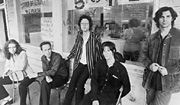NEWS FLASH: I spoke on the phone with Jayhawks frontman Gary Louris for about a half hour recently and at no point did either one of us mention the term “alt-country” or any derivation thereof. It just never came up. Louris, whose voice reverberated off the tiles of the bath in his Minneapolis home as he tried to remove a broken showerhead (“I’m not very handy,” he conceded), had plenty to say on the subject of the Jayhawks’ new pop album, Smile (Columbia), though.
The Jayhawks
Showbox, Thursday, June 8
Which is why I come out swinging with questions about . . . sequencing? Y’see, I’d noticed that Smile‘s most rockin’, most passionate, most psychedelic-Beatles-esque tune, “Baby, Baby, Baby,” doesn’t come till the very end—not very helpful for those with short attention spans. Why not slap it somewhere in the middle to stir things up?
“It’s a car-crash song,” Louris says, bemused. Then comes another shocker: Smile‘s a sort of concept album, about a guy who struggles to maintain an optimistic outlook on life, who falls in love and really likes it, but then kicks it. Hence “Baby, Baby, Baby” at the end. “The person dies, so there’s not much else that goes on afterwards except he flies up into heaven, which is what the coda is.” To be more exact, the coda’s a noisy swath of guitar solos with bent notes and descending chords and about 30 seconds of squalling feedback that’d make Neil Young do a jig.
Not to give you the wrong impression. Most of Smile is subdued in comparison, with mellifluous ballads and toe-tapping melodies that intermingle seamlessly. The shuffling, surging “I’m Gonna Make You Love Me” segues into the thoughtful, loop-backed “What Led Me To This Town”; the insistent rock of “Life Floats By” gives way to the acoustic plaintiveness of “Broken Harpoon.” And somewhere in the middle comes “A Break in the Clouds,” the most sublime and appealing pop song the Jayhawks have recorded since 1992’s “Waiting for the Sun.” Like most Louris tunes, “Break” hinges on a rousing chorus: “Every time that I see your face/It’s like cool, cool water running down my back/Cool, cool water running down my back.” It’s the kind of chorus you hear on the radio, and the next thing you know you’re embarrassing yourself in front of a record clerk trying to figure out who the heck sings it.
How does Louris write such catchy hooks? “Certain things I hear click with me and feel emotional and beautiful and complete the song,” he says. “That’s what happens when you write a chorus that feels like a chorus. It’s uplifting. It rises at the right time.”
LOURIS DIDN’T DO it all himself. He and the Jayhawks’ cofounder, bassist Marc Perlman, are now on their sixth album together—not counting the two they’ve recorded as members of Golden Smog. They’ve weathered intraband turmoil, record company crises, childbirth (Karen Grotberg, who sings and plays keys on Smile, has yielded her touring spot to Jen Gunderman; Louris and his wife have a year-old boy named Henry), and the loss several years ago of Louris’ coconspirator Marc Olson, who moved to California with his wife Victoria Williams and never looked back.
Olson’s darker vision counterbalanced Louris’ sunnier disposition on the Jayhawks’ first two independent releases and the ’92 breakthrough/major-label debut, Hollywood Town Hall. He stuck with the group through 1995’s Tomorrow the Green Grass, but then split from his longtime songwriting partner. Speculation about the Jayhawks’ breakup became widespread (this was at the height of alt-country mania, remember), but Louris, Perlman, and Grotberg cobbled together a new lineup (with drummer/backing vocalist Tim O’Reagan and guitarist Kraig Johnson, now permanent members) and recorded 1997’s Sound of Lies. If you’ve never heard of it, that’s because the label, American, lost its distribution deal a few weeks after its release and it’s been hard to find ever since.
With Smile, the band is finally over Olson’s departure and the label difficulties—having signed on with Columbia—and has already etched a new aesthetic. “When Marc Olson left, our hand was kind of forced,” Louris confides. “We wanted to maintain what we had, but not try to find somebody who would take his place and hope no one noticed. It just happened that we were blessed with two other really good singers—assuming I’m a good singer— in Tim and Karen. By them coming forward in the mix we discovered a whole other identity that still worked within the framework of where we wanted to go and where we had been.”
LOURIS IS HINTING that the Jayhawks don’t really do the twang thing anymore. Sure, they’re still rootsy and they can climb onstage and play chestnuts such as “Settle Down Like Rain” with down-home charm. But Smile sounds more expansive and elaborate than anything they’ve done previously; it’s almost like something out of the ’70s, though without any retro trappings. It makes sense, given the hand of producer Bob Ezrin, whose credits include Kiss, Alice Cooper, and Pink Floyd’s The Wall. Louris says he’d been hoping to craft a record as non-genre-specific as Yo La Tengo’s I Can Hear the Heart Beating as One and even thought about hiring on that album’s producer, Roger Moutenot. Instead, the band wound up with Ezrin and they’ve been friends since.
Louris even credits the producer with scaling back the concept-album approach he had in mind for Smile, which led to the album’s wealth of solid songs. “It almost became a very structured concept record,” Louris admits. “But ironically, the king of concept records, Bob Ezrin, pulled me back.”
Probably a good thing, Gary.






